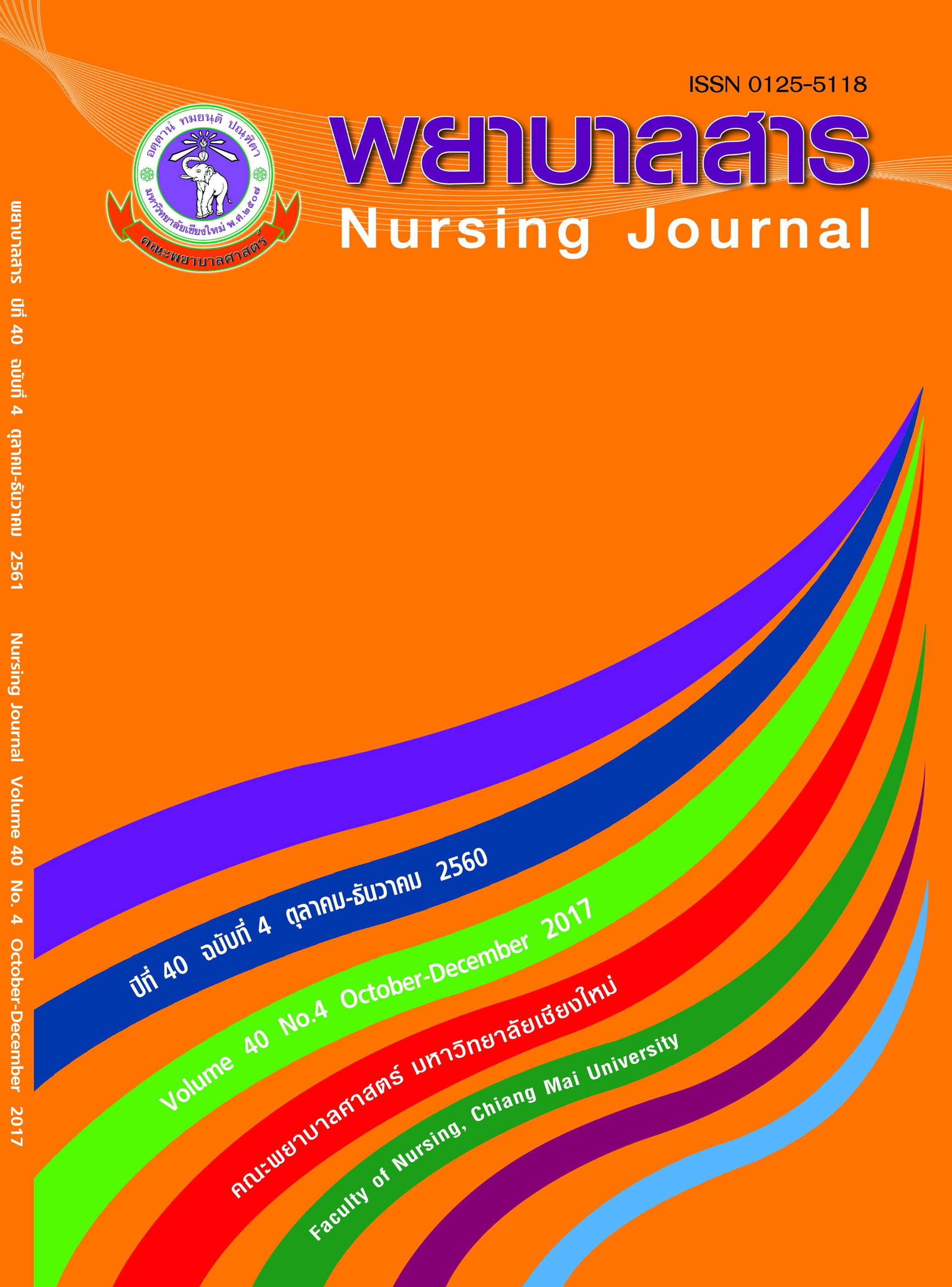Effects of Therapeutic Regimen Adherence Enhancing Strategies on Exacerbations Among Persons with Chronic Obstructive Pulmonary Disease
Keywords:
Therapeutic Regimen Adherence, Therapeutic Regimen Adherence Enhancing Strategies, Exacerbations, Chronic Obstructive Pulmonary DiseaseAbstract
Persons with chronic obstructive pulmonary disease should adhere to a therapeutic regimen for effective control of exacerbations. This experimental research aimed to examine the effects of therapeutic regimen adherence enhancing strategies on exacerbations among persons with chronic obstructive pulmonary disease. The subjects of the study were persons with chronic obstructive pulmonary disease attending the chronic obstructive pulmonary disease department and the outpatient patient department, Thasala Hospital, Nakhonsrithamaraj Province from March to June 2014. Sixty-four subjects were purposively selected by pair matching technique and divided into a control and an experimental group, with 32 in each group. Research instruments consisted of, 1) the demographic data record form, 2) the therapeutic regimen adherence interview questions form for persons with chronic obstructive pulmonary disease, 3) therapeutic regimen adherence enhancing strategies plan for persons with chronic obstructive pulmonary disease, 4) the educational hand book for persons with chronic obstructive pulmonary disease, 5) the adherence monitoring recording form for researcher and 6) the adherence self-recording form for persons with chronic obstructive pulmonary disease. Data were analyzed by using descriptive statistics, and the Mann-Whitney U-test.
Research results revealed that:
The mean number of exacerbations among persons with chronic obstructive pulmonary disease who received therapeutic regimen adherence enhancing strategies were statistical significantly lower than those who did not (p < .05).
Results of this study demonstrated that therapeutic regimen adherence enhancing strategies can decrease the frequency of exacerbations among persons with chronic obstructive pulmonary disease. These strategies can be used to improve the quality of nursing care for this population.
References
นรรัตน์ สมเพชร, ชิดชนก เรือนก้อน, และ อัญชลี เพิ่มสุวรรณ. (2550). ผลการเตือนทางโทรศัพท์ต่อความ
ร่วมมือในการใช้ยาลดความดันโลหิตของผู้ป่วยนอก. สงขลานครินทร์เวชสาร, 25(2), 89-97.
มนัส พงศ์ชัยเดชา, อุไรวรรณ ตระการกิจวิชิต, และ กิตติ พิทักษ์นิตินันท์. (2549). ผลของการให้คำปรึกษา
ด้านยาแก่ผู้ป่วยในต่อความร่วมมือในการใช้ยาตามสั่งของผู้ป่วยโรคหืดและหลอดลมอุดกั้นเรื้อรัง. Retrieved from http://www.thaihp.org/index.php?option=other_detail &lang=th&id=37&sub=26
ดวงใจ สุวรรณพงศ์. (2552). ผลของการพยาบาลตามทฤษฎีความสำเร็จตามจุดมุ่งหมายต่อพฤติกรรม
การฟื้นฟูสมรรถภาพปอดของผู้ป่วยโรคปอดอุดกั้นเรื้อรัง. พยาบาลสาร, 36(3), 114-124.
โรงพยาบาลท่าศาลา. (2555). แบบรายงานข้อมูลสถานะสุขภาพประจำปี 2555. นครศรีธรรมราช:
โรงพยาบาลท่าศาลา.
Arnold, E., Bruton, A., & Ellis-Hill, C. (2006). Adherence to pulmonary rehabilitation: A qualitative study. Respiratory Medicine, 100(10), 1716-1723. doi:10.1016/j.rmed.2006.02.007
Bourbeau, J., & Bartlett, S. J. (2008). Patient adherence in COPD. Thorax, 63(9), 831-838. doi:10.1136/thx.2007.086041
Brunton, A. S. (2011). Improving medication adherence in chronic disease management. Journal of Family Practice, 60(Supple. 4), S1-S8.
Burns, N., & Grove, S. K. (2005). The practice of nursing research conduct, critique, and utilization (5th ed.). Philadelphia: Elsevier Saunders.
Gillissen, A., Wirtz, H., & Juergens, U. (2007). Patient and physician factors contributing to poor outcomes in patients with asthma and COPD. Disease Management & Health Outcomes, 15(6), 355-376. doi:10.2165/00115677-200715060-00004
Global Initiative for Chronic Obstructive Lung Disease. (2011). Global strategy for the diagnosis, management and prevention of COPD. Retrieved from http://www.goldcopd.org
Howell, G. (2008). Nonadherence to medical therapy in asthma: risk factors, barriers, and strategies for improving. The Journal of Asthma, 45(9), 723-729. doi:10.1080/02770900802395512.
King, I. M. (1981). A theory for nursing: System, concept, process. New York: John Wiley &
Sons.
Krigsman, K., Nilsson, J., L., & Ring, L. (2007). Refill adherence for patients with asthma and COPD: Comparison of a pharmacy record database with manually collected repeat prescriptions. Pharmacoepidemiology and Drug Safety, 16(4), 441-448.
Make, B. J. (2003). Chronic obstructive pulmonary disease: developing comprehensive
management. Respiratory care, 48(12), 1225-1237.
Oyekan, E., Nimalasuriya, A., Martin, J., Scott, R., Dudl, J., & Green, K. (2009).The B-SMART
Appropriate Medication-Use Process: A Guide for Clinicians to Help Patients Part 1:
Barriers, Solutions, and Motivation.Clinical Medicine, 3(1), 62-69.
Soriano, J. B., Kiri, V. A., Pride, N. B., & Vestbo, J. (2003). Inhaled corticosteroids with/without
long-acting β-agonists reduce the risk of rehospitalization and death in COPD patients. American Journal of Respiratory Medicine, 2(1), 67-74.
Tancharoenrat, W. (2005). Factors influence compliance of patients with chronic obstructive pulmonary disease (Unpublished master’s thesis). Mahidol University, Bangkok, Thailand.
World Health Organization. (2003). Adherence to long-term therapies: Evidence for action. Geneva, Switzerland: Author.
World Health Organization. (2010). World health statistics 2010. Retrieved from http://www.who.inc./whosis/whostar/2010/en/index.html
Downloads
Published
How to Cite
Issue
Section
License
บทความที่ได้รับการตีพิมพ์เป็นลิขสิทธิ์ของวารสารพยาบาลสาร
ข้อความที่ปรากฏในบทความแต่ละเรื่องในวารสารวิชาการเล่มนี้เป็นความคิดเห็นส่วนตัวของผู้เขียนแต่ละท่านไม่เกี่ยวข้องกับมหาวิทยาลัยเชียงใหม่ และคณาจารย์ท่านอื่นๆในมหาวิทยาลัยฯ แต่อย่างใด ความรับผิดชอบองค์ประกอบทั้งหมดของบทความแต่ละเรื่องเป็นของผู้เขียนแต่ละท่าน หากมีความผิดพลาดใด ๆ ผู้เขียนแต่ละท่านจะรับผิดชอบบทความของตนเองแต่ผู้เดียว






